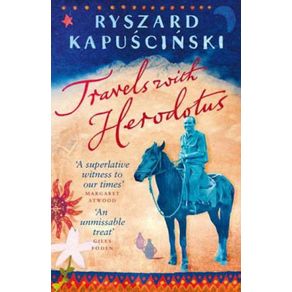Sinopse
As a novice reporter in the 1950s, the young Ryzsard Kapuscinski wanted nothing more than to travel outside the borders of Poland. One day, without warning, his editor called him into her office and told him he was being sent to India. `At the end of our conversation, during which I learned that I would indeed be going forth into the world, Tarlowska reached into a cabinet, took out a book, and handing it to me said "Here, a present for the road." It was a thick book with a stiff cover of yellow cloth. On the front, stamped in gold letters, was Herodotus The Histories.' Travels with Herodotus records how Kapuscinski set out on his first forays - to India, China and Africa - with the great Greek historian constantly in his pocket. He sees Louis Armstrong in Khartoum, visits Dar-es-Salaam, arrives in Algiers in time for a coup when nothing seems to happen (but he sees the Mediterranean for the first time). At every encounter with a new culture, Kapuscinski plunges in, curious and observant, thirsting to understand its history, its thought, its people. And he reads Herodotus so much that he often feels he is embarking on two journeys - the first his assignment as a reporter, the second following Herodotus' expeditions. So woven intohis accounts of his travels here are his retellings of Herodotus epic stories. His whole life as a reporter is a dialogue with what he calls `world literature's first great work of reportage.' What kind of restless, enquiring traveller was its author? he asks. `Man is by nature a sedentary creature, settled down happily, naturally, on his particular patch of earth ... But to traverse the world for years in order to get to know it, to plumb it, to understand it? And then, later, to put all his findings into words? Such people have always been uncommon.'
Ficha Técnica
Especificações
| ISBN | 9780141021140 |
|---|---|
| Pré venda | Não |
| Peso | 322g |
| Autor para link | KAPUSCINSKI RYSZARD |
| Livro disponível - pronta entrega | Não |
| Dimensões | 23 x 16 x 1 |
| Tipo item | Livro Importado |
| Número de páginas | 288 |
| Número da edição | 1ª EDIÇAO - 2008 |
| Código Interno | 504425 |
| Código de barras | 9780141021140 |
| Acabamento | PAPERBACK |
| Autor | KAPUSCINSKI, RYSZARD |
| Editora | PENGUIN UK |
| Sob encomenda | Não |



